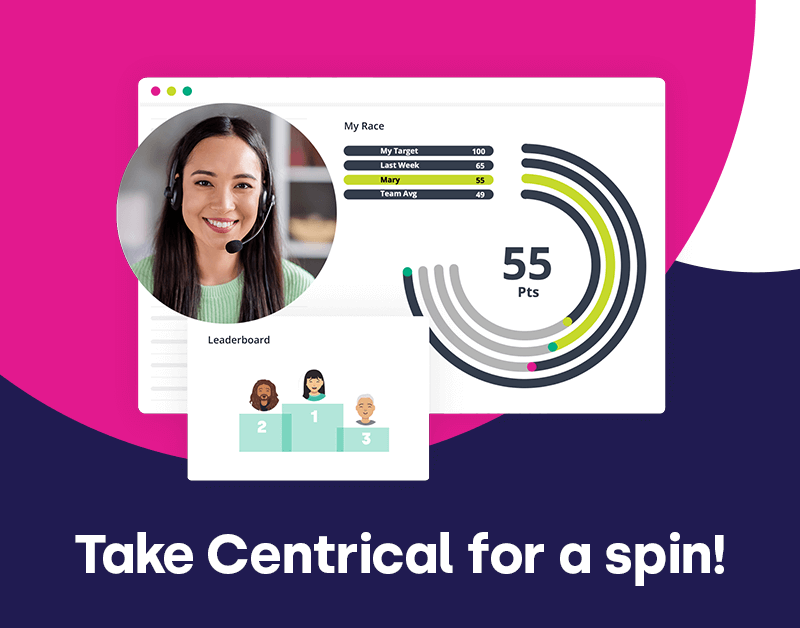At a time when a key differentiator of an organization is the service offered to their customers, both enterprise contact centers and BPOs are at the forefront of delivering best-in-class service. We know that customer experience-focused companies are three times more profitable than those that don’t focus on customer experience. And yet, the role of the frontline contact center employee is still considered entry-level and can be the lowest paid in a company.
None of this makes sense, especially when we consider that contact center and BPO agents deal with complex queries across multiple channels while spending a lot of time supporting vulnerable customers.
BPOs must serve customers in the best way possible, yet due to competition and an ever-changing employment market, companies often fail to hire experienced agents or will undervalue their employees through low pay and high expectations (and stress).
Let’s examine this dichotomy and look at how to turn things around.
The Problem
Frontline employees are expected to offer a great customer experience – after all, that is the crux of their job. As extensions of their customers, what are BPOs doing to create the conditions for employees to provide this service to the best of their abilities? Below are some common barriers to success:
- Customer service employees are considered entry-level, “unskilled” workers. However, with the complexity of today’s queries, customer self-service options, and chatbots, this isn’t the case, as human interactions often require highly skilled employees
- Companies outsource roles and contact volumes to BPOs and can lose control of who is hired to be the face of their brand
- The role of a frontline customer service employee is often low-paid, with inflexible schedules and ever-changing customer and business demands
- The role offers little autonomy and is highly scripted, and strictly procedural
These elements do not empower or motivate an employee to do their best work, nor do they signal to agents that they are valued or cared for. According to one study, 87% of BPO workers reported high or very high-stress levels at work. The same study reports over 50% feel emotionally drained after their workday.
Customer service agents have a hard job. So how can they receive the support they need to keep delivering?
Some leaders try to fix this problem by introducing “fun committees” that throw pizza parties and dress-up days in an attempt to boost morale. But again, let’s think: does treating adults like children who get excited over pizza inspire them to do their best work? I’ll let you answer that one…
Meeting Customer Expectations by Meeting Employee Expectations
To be fair, not all BPOs struggle with these problems. I’ve had the privilege of being a judge in contact center awards around the world, and I have witnessed some inspiring operations and cultures. I have led multiple award-winning contact centers, too, but for every great center, there are enough that are stuck in outdated, disempowering, antiquated ways of working that warrant this to be addressed.
To boost the customer experience, we must start by empowering employees and creating positive conditions to boost engagement. Happy employees work hard to create happy customers.
Here are a few areas where leaders can focus:
Autonomy: Great customer experience is about reducing friction. If a BPO employee can’t venture from rigid scripts with uncompromising policies, there will be friction. Allowing autonomy and the ability to have genuine conversations with customers and offer real solutions can transform how employees feel about their job and raise productivity. (This also improves CSAT!)
Ownership: Along the lines of autonomy, contact center employees must be empowered to offer solutions. It is a terrible disservice to customers when they are transferred to multiple departments. Increase ownership by training and empowering employees to make decisions and resolve the issue, rather than putting them on hold…again.
Balancing Quality and Quantity: The average duration of a customer service call is four minutes. Rushing through as many calls as possible might look efficient on paper but doesn’t necessarily provide a quality customer experience. Rather than pushing a customer off the phone, letting them vent or talk can be an optimal customer experience! The key here is empowering agents to know when they must balance resolution time with a quality call that might take a little longer.
Training and Growth: Comprehensive onboarding and regular training are critical first steps to employee success. Offering advancement opportunities will show employees that they are valued and that the BPO wants to invest in them. When employees see a path forward and opportunities, they are more likely to remain with the company.
Coaching: Whether employees are new to customer service or have years of experience, everyone needs guidance. Coaching should be consistent, well-framed, and offer actionable next steps. Managers should be prepared to discuss successes, areas of opportunity, improvement plans, and of course, counsel employees on career progression.
Coaching, Part 2: While we’ve mentioned the importance of coaching employees, let’s not forget the difficult role of frontline managers. Managers are employees, too, and supporting them in providing effective coaching is critical to ensuring a positive customer and employee experience. This includes making it easy for managers to access the data they need to lead effective coaching conversations and enabling them to connect with employees one-on-one on a regular basis, regardless of location. As a note, here at Centrical, we feel that coaching should be as easy as possible for managers – here is a look at our approach.
Getting Started
Since 2013, Centrical has helped the world’s leading BPOs modernize and improve their employee experience. Our platform helps leaders easily and efficiently implement core elements to employee (and enterprise) success, including:
Personalized microlearning: Learning and development go well beyond onboarding, especially in the BPO environment, where client expectations and requirements change often and new support channels require constant reskilling and upskilling. Personalized, performance-based learning delivered as part of the regular workflow helps motivate daily learning and enables better knowledge retention than traditional methods.
Real-time performance management: Enable agents to own, and boost, their performance. The Centrical platform provides clarity on goals (e.g., FCR, AHT, Product Knowledge, Transfer Rate) and provides a feedback loop with learning and support to drive improvement and growth.
AI-powered coaching: Managers often spend an inordinate amount of time digging through data coming from multiple systems and limit coaching to reactive conversations. Personalized coaching insights and guided actions based on employee performance and wellness indicators help managers proactively coach agents on a personal basis and at frequent intervals.
Gamification: Incorporating motivating game narratives that make agents feel a part of something bigger than themselves, individual and team challenges, badges, recognition, and other game-related elements vastly improve employee engagement, performance, and productivity while instilling a sense of purpose and camaraderie among the team.
Key Takeaways
If customer experience-focused organizations are three times more profitable, then BPOs need to rethink how they structure employee experience around employee expectations. More autonomy, personal and professional development, ownership, and purpose would be a smart first step toward that increased profit. While many BPOs worldwide understand this, there are many more who could use a cultural refresh. Below are a few thoughts to keep in mind:
- A positive experience that meets employee expectations is foundational to delivering top-notch customer service
- Despite their importance to BPOs, customer service agents are often in a low-tier, low-paid, and high-stress role with few learning and development opportunities
- When agents lack autonomy, training, coaching, and a career path, their performance suffers, right along with customer service
- Pizza parties don’t constitute a long-term motivational and retention strategy, but learning and development opportunities, career progression, and role ownership do
- Modernizing today’s BPO employee experience doesn’t have to be hard. Centrical can act as a strategic partner, helping your enterprise evolve today to meet tomorrow’s employee experience challenges
In short, if you want to boost your CX, you must start treating—and compensating—employees as the customer service professionals they are. Remember: that return on investment is going to be 3X!
To learn more about getting started with bridging the dichotomy within your BPO, see our platform in action, and contact our team of engagement experts for a personalized overview.
Publishing Note:
Would love to add a section in the middle or on a sidebar with an “Explore more” or “Read more” where we feature 3-5 additional Centrical items. This will drive traffic to other areas of our site and hopefully generate some leads with gated content. Below are some recommended titles (do we need any special tracking URLs so we can measure the efficacy of CTs via the read more section?)
Read More
2023: The Year Of Intentional Employee Transformation (forbes.com)
The First 90 Days: Using Gamification to Engage and Retain New Contact Center Hires
Meeting KPIs in BPO Call Centers
Engage and motivate your frontline teams
Improve performance with an AI-powered digital coach
Deliver world class CX with dynamic, actionable quality evaluations
Boost performance with personalized, actionable goals
Nurture employee success with the power of AI
Listen and respond to your frontline, continuously
Drive productivity with performance-driven learning that sticks
Drive agent efficiency, deliver client results
Keep tech teams motivated and proficient on products and services while exceeding targets
Maintain compliance while building customer happiness and loyalty
Enlighten energy teams to boost engagement
Engage, develop, and retain your agents while driving better CX
Improve the employee experience for your reservations and service desk agents







 Madeleine Freind
Madeleine Freind
 Natalie Roth
Natalie Roth Linat Mart
Linat Mart












 Doron Neumann
Doron Neumann Gal Rimon
Gal Rimon Daphne Saragosti
Daphne Saragosti Ella Davidson
Ella Davidson Ariel Herman
Ariel Herman Ronen Botzer
Ronen Botzer